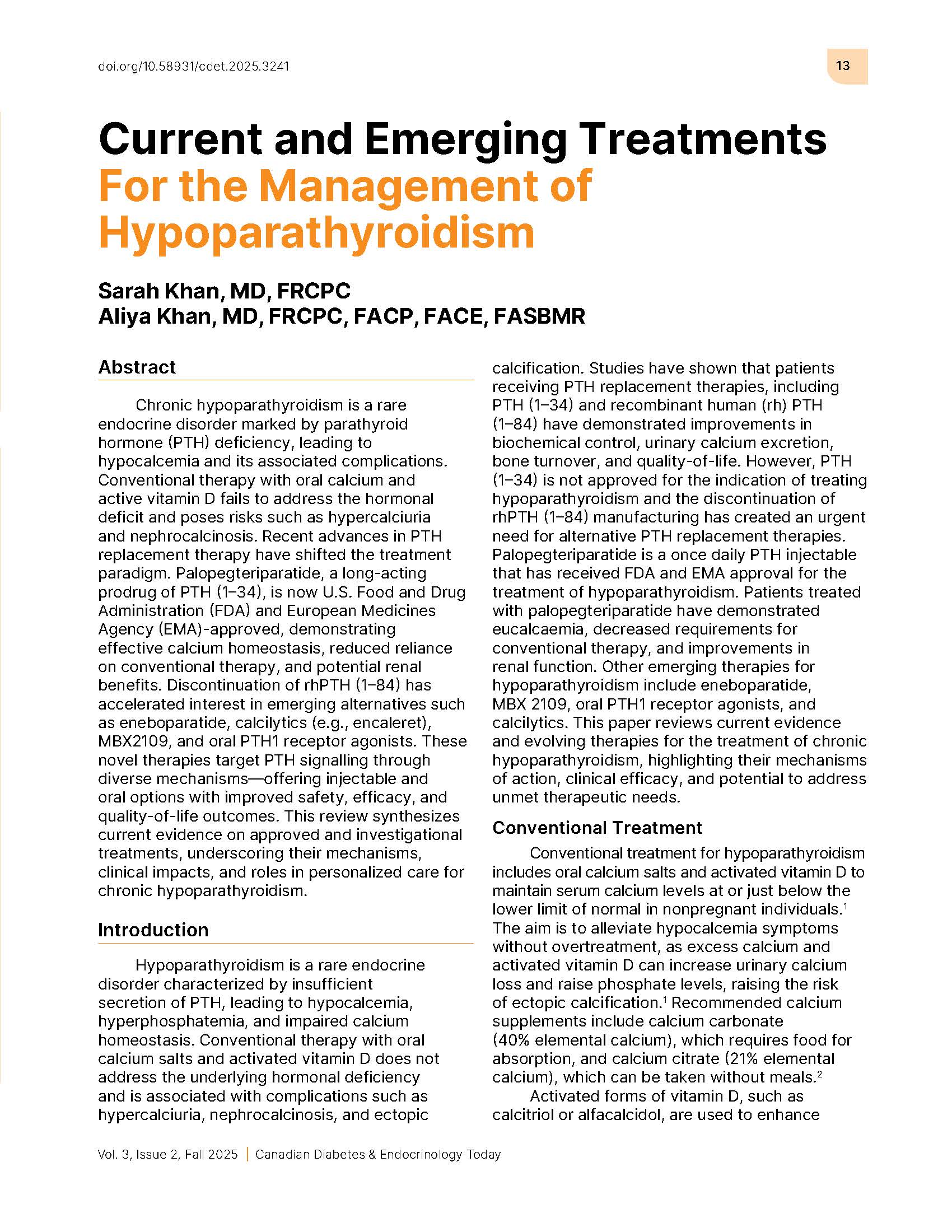Current and Emerging Treatments For the Management of Hypoparathyroidism
DOI:
https://doi.org/10.58931/cdet.2025.3241Abstract
Chronic hypoparathyroidism is a rare endocrine disorder marked by parathyroid hormone (PTH) deficiency, leading to hypocalcemia and its associated complications. Conventional therapy with oral calcium and active vitamin D fails to address the hormonal deficit and poses risks such as hypercalciuria and nephrocalcinosis. Recent advances in PTH replacement therapy have shifted the treatment paradigm. Palopegteriparatide, a long-acting prodrug of PTH (1–34), is now U.S. Food and Drug Administration (FDA) and European Medicines Agency (EMA)-approved, demonstrating effective calcium homeostasis, reduced reliance on conventional therapy, and potential renal benefits. Discontinuation of rhPTH (1–84) has accelerated interest in emerging alternatives such as eneboparatide, calcilytics (e.g., encaleret), MBX2109, and oral PTH1 receptor agonists. These novel therapies target PTH signalling through diverse mechanisms—offering injectable and oral options with improved safety, efficacy, and quality-of-life outcomes. This review synthesizes current evidence on approved and investigational treatments, underscoring their mechanisms, clinical impacts, and roles in personalized care for chronic hypoparathyroidism.
References
Khan AA, Guyatt G, Ali DS, Bilezikian JP, Collins MT, Dandurand K, et al. Management of hypoparathyroidism. J Bone Miner Res. 2022;37(12):2663–2677. doi:10.1002/jbmr.4716 DOI: https://doi.org/10.1002/jbmr.4716
Khan S, Khan AA. Hypoparathyroidism: diagnosis, management and emerging therapies. Nat Rev Endocrinol. 2025;21(6):360-374. doi:10.1038/s41574-024-01075-8 DOI: https://doi.org/10.1038/s41574-024-01075-8
Karpf DB, Pihl S, Mourya S, Mortensen E, Kovoor E, Markova D, et al. A Randomized double-blind placebo-controlled first-in-human phase 1 trial of TransCon PTH in healthy adults. J Bone Miner Res. 2020;35(8):1430–1440. doi:10.1002/jbmr.4016 DOI: https://doi.org/10.1002/jbmr.4016
Khan AA, Bilezikian JP, Brandi ML, Clarke BL, Gittoes NJ, Pasieka JL, et al. Evaluation and management of hypoparathyroidism summary statement and guidelines from the Second International Workshop. J Bone Miner Res. 2022;37(12):2568–2585. doi:10.1002/jbmr.4691 DOI: https://doi.org/10.1002/jbmr.4691
Khan AA, Rejnmark L, Rubin M, Schwarz P, Vokes T, Clarke B, et al. PaTH Forward: a randomized, double-blind, placebo-controlled phase 2 trial of TransCon PTH in adult hypoparathyroidism. J Clin Endocrinol Metab. 2022;107(1):e372–e385. doi:10.1210/clinem/dgab577 DOI: https://doi.org/10.1210/clinem/dgab577
Khan AA, Rubin MR, Schwarz P, Vokes T, Shoback DM, Gagnon C, et al. Efficacy and safety of parathyroid hormone replacement with TransCon PTH in hypoparathyroidism: 26-week results from the Phase 3 PaTHway trial. J Bone Miner Res. 2023;38(1):14–25. doi:10.1002/jbmr.4726 DOI: https://doi.org/10.1002/jbmr.4726
Rejnmark L, Gosmanova EO, Khan AA, Makita N, Imanishi Y, Takeuchi Y, et al. Palopegteriparatide treatment improves renal function in adults with chronic hypoparathyroidism: 1-year results from the phase 3 PaTHway trial. Adv Ther. 2024;41(6):2500–2518. doi:10.1007/s12325-024-02843-8 DOI: https://doi.org/10.1007/s12325-024-02843-8
Tsourdi E, Rubin M, Khan A, Schwarz P, Ahmed I, Palermo A, et al. Palopegteriparatide improves skeletal dynamics in adults with chronic hypoparathyroidism: 162-week results from the phase 2 PaTH Forward trial. Osteologie. 2025;34(02):145-146. doi:10.1055/s-0045-1804971 DOI: https://doi.org/10.1055/s-0045-1804971
Clarke BL, Khan AA, Rubin MR, Schwarz P, Vokes T, Shoback DM, et al. Efficacy and safety of transcon pth in adults with hypoparathyroidism: 52-week results from the phase 3 PaTHway trial. [published correction appears in J Clin Endocrinol Metab. 2025 Mar 17;110(4):e1292-e1293. doi: 10.1210/clinem/dgaf048.]. J Clin Endocrinol Metab. 2025;110(4):951-960. doi:10.1210/clinem/dgae693 DOI: https://doi.org/10.1210/clinem/dgaf048
Shimizu M, Joyashiki E, Noda H, Watanabe T, Okazaki M, Nagayasu M, et al. Pharmacodynamic actions of a long-acting PTH analog (LA-PTH) in thyroparathyroidectomized (TPTX) rats and normal monkeys. J Bone Miner Res. 2016;31(7):1405–1412. doi:10.1002/jbmr.2811 DOI: https://doi.org/10.1002/jbmr.2811
Allas S, Ovize M, Culler MD, Geraul C, Van De Wetering J, Mannstadt M. A single administration of AZP-3601, a novel, long-acting PTH analog, induces a significant and sustained calcemic response: preliminary data from a randomized, double-blind, placebo-controlled phase 1 study. Journal of the Endocrine Society. 2021;5(Supplement_1):A254–A254. doi:10.1210/jendso/bvab048.516 DOI: https://doi.org/10.1210/jendso/bvab048.516
Takacs I, Mezosi E, Soto A, Kamenický P, Figueres L, Moreno MAG, et al. An open-label phase 2 study of eneboparatide, a novel PTH receptor 1 agonist, in hypoparathyroidism. J clin Endocrinol Metab. 2024;109(9):2199-2209. doi:10.1210/clinem/dgae121 DOI: https://doi.org/10.1210/clinem/dgae121
Gafni RI, Hartley IR, Roszko KL, Nemeth EF, Pozo KA, Lombardi E, et al. Efficacy and safety of encaleret in autosomal dominant hypocalcemia type 1. N Engl J Med. 2023;389(13):1245–1247. doi:10.1056/NEJMc2302708 DOI: https://doi.org/10.1056/NEJMc2302708
Roberts MS, Gafni RI, Brillante B, Guthrie LC, Streit J, Gash D, et al. Treatment of autosomal dominant hypocalcemia type 1 with the calcilytic NPSP795 (SHP635). J Bone Miner Res. 2019;34(9):1609–1618. doi:10.1002/jbmr.3747 DOI: https://doi.org/10.1002/jbmr.3747
Hannan FM, Kooblall KG, Stevenson M, Elajnaf T, Liu F, Lines KE, et al. Characterization of quinazolinone calcilytic therapy for autosomal dominant hypocalcemia type 1 (ADH1). J Biol Chem. 2025;301(4):108404. doi:10.1016/j.jbc.2025.108404 DOI: https://doi.org/10.1016/j.jbc.2025.108404
Carney P, Cutler GB, Jr., Schneider K, Zhang F, DiMarchi R. MBX 2109, a once-weekly parathyroid hormone replacement therapy prodrug: phase 1, first-in-human, randomized trial. [published correction appears in J Clin Endocrinol Metab. 2025 Mar 17;110(4):e1294. doi: 10.1210/clinem/dgae889.]. J Clin Endocrinol Metab. 2025;110(4):940-950. doi:10.1210/clinem/dgae808 DOI: https://doi.org/10.1210/clinem/dgae808
Zhang J, Gomez I, He C, Wang J, Du X, Nguyen K, et al. 9263 Characterization Of A Novel Oral Small Molecule PTH1R Agonist: Proof Of Concept For An Alternative To Injectable Peptide-Based Therapy For Hypoparathyroidism. Journal of the Endocrine Society. 2024;8(Supplement_1). doi:10.1210/jendso/bvae163.385 DOI: https://doi.org/10.1210/jendso/bvae163.385

Downloads
Published
How to Cite
Issue
Section
License
Copyright (c) 2025 Canadian Diabetes & Endocrinology Today

This work is licensed under a Creative Commons Attribution-NonCommercial-NoDerivatives 4.0 International License.
